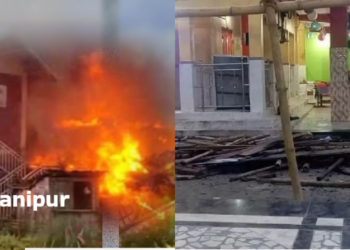Iran claims its strike on Al Udeid Airbase in Qatar was a “precise retaliation” for U.S. attacks on nuclear facilities. Meanwhile, Israel faces continuing missile barrages amid soaring regional death tolls.
BY PC Bureau
June 24, 2025– Iran’s Supreme Leader Ayatollah Ali Khamenei reiterated a resolute stance against surrender in the face of U.S. and Israeli military actions, as tensions in the Middle East reached a boiling point. In a statement posted on his official X account late Monday, Khamenei declared, “We will not surrender to anyone’s violation; this is the logic of the nation of Iran,” accompanied by an illustration of a burning American flag, signaling Iran’s unwavering resolve.
The statement follows a series of aggressive military exchanges, including Iran’s missile attack on the Al Udeid U.S. airbase in Qatar on June 23, 2025, which Tehran claimed was retaliation for U.S. airstrikes on three of its nuclear facilities. According to Reuters, Qatar’s authorities reported that the attack was intercepted with no casualties, though the nation temporarily closed its airspace, and oil companies began evacuating staff from Iraq.
READ: Big Win for Tribals: Adani Plant Out of Kokrajhar?
The conflict, which intensified after Israel’s surprise strikes on Iranian nuclear sites on June 13, has led to significant casualties. Iran’s Ministry of Health reports over 400 deaths, mostly civilians, from Israeli attacks, while Iranian retaliatory strikes have killed at least 24 people in Israel, according to Israeli authorities. The U.S. joined the fray on June 21, deploying 30,000-pound bunker-buster bombs on Iran’s Fordo nuclear facility, with President Donald Trump claiming the strikes caused damage “far below ground level.”
Footage from Doha.
Iran has decided to attack American installations in Qatar. The Gulf state that has been most willing to engage with them. They are such brilliant chess masters. pic.twitter.com/z01uZlQoAk
— Richard Hanania (@RichardHanania) June 23, 2025
Iran’s leadership has vowed both military and diplomatic responses. The country’s parliament voted to block the Strait of Hormuz, a critical global oil shipping lane, raising fears of economic disruption. Additionally, Iran’s Foreign Minister Abbas Araghchi met with Russian officials in Moscow, delivering a letter from Khamenei, signaling potential alignment with allies to counter Western aggression.
READ: Iran Claims Strike on U.S. Base in Qatar Was “Devastating.”
Global reactions have been mixed. Hamas and the Houthis condemned the U.S. strikes, with the Houthis pledging support for Iran against “Zionist and American aggression.” Meanwhile, international leaders, including Saudi Arabia, have called for de-escalation, condemning violations of Iran’s sovereignty. In the U.S., House Minority Leader Hakeem Jeffries criticized the White House for failing to provide a classified briefing on the strikes, raising concerns about transparency.
As air raid sirens echoed across Israel and protests erupted in Tehran, the world awaits Iran’s next move. Analysts suggest Tehran faces grim choices, from swarm attacks to cyberattacks or restraint to avoid further escalation. With global markets rattled—Bitcoin fell 2% to $99,380, and India’s Sensex dropped 705 points—fears of a broader regional conflict loom large.
“We will write the end of this story,” Khamenei vowed, signaling Iran’s intent to retaliate forcefully. As the conflict enters its second week, the international community braces for the potential consequences of a prolonged and volatile standoff.













